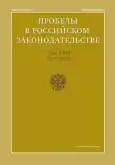Эволюция системы консультативных (совещательных) органов при Президенте Российской Федерации
- Авторы: Липатов В.Д.1, Мельников С.А.1,2
-
Учреждения:
- Российская академия народного хозяйства и службы при Президенте Российской Федерации
- Институт этнологии и антропологии имени Н.Н. Миклухо-Маклая РАН
- Выпуск: Том 18, № 5 (2025)
- Страницы: 19-24
- Раздел: Публично-правовые (государственно-правовые) науки
- URL: https://bakhtiniada.ru/2072-3164/article/view/349736
- DOI: https://doi.org/10.33693/2072-3164-2025-18-5-19-24
- EDN: https://elibrary.ru/YBNEDM
- ID: 349736
Цитировать
Аннотация
Цель исследования. Настоящая работа сфокусирована на исследовании эволюционных процессов, затронувших систему консультативных (совещательных) органов, функционирующих при Президенте Российской Федерации. В рамках исследования рассматривается историческая обусловленность формирования данных органов, а также проводится аналитическая оценка их функциональной структуры и роли в период становления института президентства в России. Особое внимание уделяется выявлению специфических характеристик, присущих консультативным (совещательным) органам на ранних этапах их развития. Трансформация и упразднение консультативных (совещательных) структур также занимают важное место в исследовании, так как изменения в политической ситуации часто приводят к необходимости пересмотра существующих институтов власти.
Выводы. В результате проведенного исследования был сделан вывод о том, что в условиях глобализации и стремительного развития информационных технологий, роль консультативных (совещательных) структур становится все более значимой, так как они способствуют адаптации государственной политики к современным вызовам и требованиям. Установлено, что консультативные (совещательные) органы не только способствуют более эффективному управлению, но и служат каналом для учета мнения гражданского общества, что в свою очередь повышает легитимность власти. Очевидна также необходимость повышения эффективности системы консультативных (совещательных) органов, в частности улучшения обратной связи между органами власти и всеми участниками процесса могло бы значительно повысить уровень реализации предлагаемых инициатив. В этой связи создание открытых платформ, на которых будут обсуждаться результаты работы консультативных (совещательных) органов, а также вырабатываться рекомендации по их оптимизации может стать важным этапом их последующей эволюции.
Полный текст
Открыть статью на сайте журналаОб авторах
Валентин Дмитриевич Липатов
Российская академия народного хозяйства и службы при Президенте Российской Федерации
Автор, ответственный за переписку.
Email: lipatov.valentin@mail.ru
SPIN-код: 6322-2592
аспирант кафедры конституционного права Юридического факультета им. М.М. Сперанского Института права и национальной безопасности
Россия, г. МоскваСергей Алексеевич Мельников
Российская академия народного хозяйства и службы при Президенте Российской Федерации; Институт этнологии и антропологии имени Н.Н. Миклухо-Маклая РАН
Email: melnikov-sa@ranepa.ru
SPIN-код: 5341-4761
доктор юрид. наук, профессор, научный руководитель, профессор кафедры конституционного права Юридического факультета имени М.М. Сперанского Института права и национальной безопасности, главный научный сотрудник
Россия, г. Москва; г. МоскваСписок литературы
- Баранов Н.А. Современная российская политика: учебник для вузов / Н.А. Баранов, Б.А. Исаев. 3-е изд., перераб. и доп. Москва: Издательство Юрайт, 2025. 432 с. (Бакалавр. Академический курс). ISBN 978-5-534-21512-0.-Текст: электронный // Образовательная платформа Юрайт [сайт]. URL: https://urait.ru/bcode/575011 (дата обращения: 06.08.2025).
- Емельянов С.В. Современные тенденции развития консультативных органов при Президенте РФ // Социальные и политические исследования. 2021. № 9. С. 34–40.
- Теплякова О.А. О статусе совещательных и координационных органов в Российской Федерации / О.А. Теплякова, А.А. Костюков // Вестник Тюменского государственного университета. Социально-экономические и правовые исследования. 2021. Том 7. № 2 (26). С. 122–134. doi: 10.21684/2411-7897-2021-7-2-122-134.
- Чеботарев Г.Н. Взаимно ответственное партнерство государства и общества / Г.Н. Чеботарев // Государство и право. 2019. № 10. С. 26–34.
Дополнительные файлы








